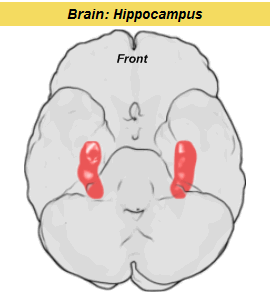|
|
|
|
|
|
|
News & Views item - July 2008 |
![]() Think About It. (July 15, 2008)
Think About It. (July 15, 2008)
A paper published this month in
PLoSONE, Lifespan Mental Activity Predicts
Diminished Rate of Hippocampal Atrophy, by Michael Valenzuela
of the University of New South Wales, Department of Psychiatry and colleagues
has made the mainstream media with the expected twist, i.e. "use it or
lose it" or at least lose a significant amount of it.
least lose a significant amount of it.
The it is the brain's hippocampus, the region of the brain which plays major roles in short term memory and spatial navigation.
As Valenzuela, et al. put it: "Epidemiological studies suggest that complex mental activity may reduce the risk for dementia, however an underlying mechanism remains unclear. Our objective was to determine whether individual differences in lifespan complex mental activity are linked to altered rates of hippocampal atrophy independent of global measures of neurodegeneration."
They examined "Thirty seven healthy older individuals had their complex mental activity levels estimated using the Lifetime of Experiences Questionnaire (LEQ) and completed serial MRI investigations at baseline and three years follow-up. Hippocampal volume and semi-automatic quantitation of whole brain volume (WBV) and white matter hyperintensities (WMHs) were compared at both time points."
They judged their results to be statistically significant and concluded: "High level of complex mental activity across the lifespan was correlated with a reduced rate of hippocampal atrophy. This finding could not be explained by general differences in intracranial volume, larger hippocampi at baseline, presence of hypertensive disease, gender or low mood. Our results suggest that neuroprotection in medial temporal lobe may be one mechanism underlying the link between mental activity and lower rates of dementia observed in population-based studies. Additional studies are required to further explore this novel finding."
What they did not conclude in the paper is what the mainstream media concluded, that high mental activity is the cause of lessening the atrophy of the hippocampus. It's possible that the inherent induction of increased mental activity also lessens the atrophy of the hippocampus.
However, The Australian does quote Dr Valenzuela saying: "I hope people take this as a further call to arms to get out there and use their brains, get engaged in anything from tai chi to world travel, in the knowledge that it may help delay or prevent the onset of dementia," and continued, "This is a significant finding because a small hippocampus is a specific risk factor for developing Alzheimer's disease."